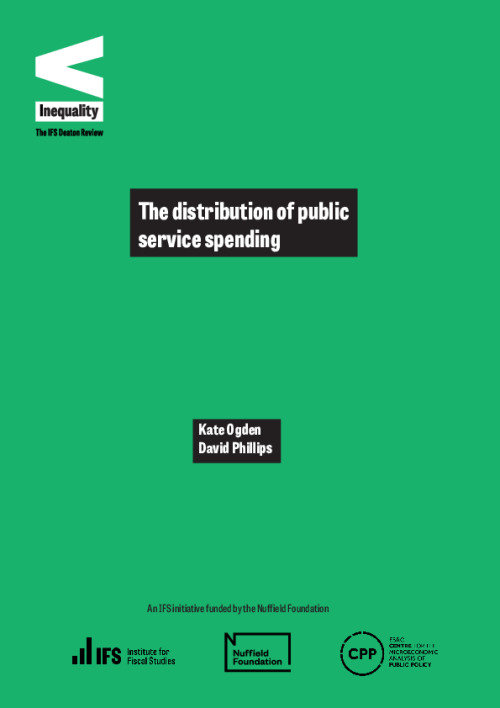
This report for the IFS-Deaton Review looks at how public service spending is distributed across the population in the UK.
Downloads

The distribution of public service spending
PDF | 1.15 MB
In 2019–20, a total of £509 billion (that is, 22.5% of GDP or £7,600 per person) was spent on providing public services and infrastructure by the various tiers of government in the UK. Unlike spending on cash benefits, the primary aim of this spending is not a general redistribution of resources among households. But spending on this scale does have big direct distributional effects – even before considering impacts of the services themselves on other dimensions of inequality, such as in educational, health and labour market outcomes.
While less studied than the distributional effects of the tax and cash benefit systems, there has been a long tradition of analysis of how public service spending is distributed across the population in the UK. This commentary has three main aims. First, to explain the key conceptual and methodological issues involved in such analysis. Second, to set out what we know about the distribution of spending on major public services, and how and why this changed over time. And third, to identify key lessons for policy and avenues for future research.
Authors

Senior Research Economist
Kate joined the IFS in 2020 and works on local government finance and higher education.

Associate Director
David is Head of Devolved and Local Government Finance. He also works on tax in developing countries as part of our TaxDev centre.
Report details
- Publisher
- Institute for Fiscal Studies
Suggested citation
Ogden, K and Phillips, D. (2023). The distribution of public service spending. London: Institute for Fiscal Studies. Available at: https://ifs.org.uk/publications/distribution-public-service-spending (accessed: 28 April 2024).
Related documents
Download data tables
XLSX | 95.22 KB
More from IFS
Understand this issue

Should we worry about government debt?
11 April 2024

Sure Start achieved its aims, then we threw it away
15 April 2024

Public investment: what you need to know
25 April 2024
Policy analysis

Recent trends in and the outlook for health-related benefits
19 April 2024

4.2 million working-age people now claiming health-related benefits, could rise by 30% by the end of the decade
19 April 2024

Living standards since the last election
21 March 2024
Academic research

Labour market inequality and the changing life cycle profile of male and female wages
15 April 2024

The menopause "penalty"
18 March 2024

There and back again: women’s marginal commuting costs
2 April 2024